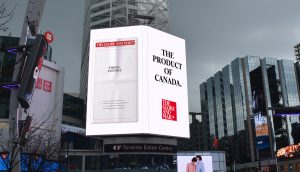Astral Media Outdoor’s proposal for Toronto’s 20-year coordinated street furniture contract scored the highest marks out of the three OOH giants bidding for it, and city management is recommending that councillors finalize the agreement. The contract will give one company control over ads on thousands of transit shelters, garbage and recycling bins, newspaper boxes, bike racks and public washrooms.
Last week, a staff report from deputy city manager Richard Butts urged the city to sign an agreement before the current transit shelter contract expires on August 31. It would require Astral Media to deliver three fully-functional prototypes of its designs before the end of 2007. The executive committee is expected to consider staff’s recommendations on April 30, after which councillors will vote on it.
Astral Media Outdoor’s proposal, along with the bids by CBS Outdoor and Clear Channel Outdoor, was made public online at Toronto.ca/StreetFurniture and put on display at the end of March. According to the staff report, the proposal guarantees the city revenue of $428.8 million over 20 years (including an initial payment of $36.5 million). Astral Media would be responsible for the $202.4 million capital investment, plus ongoing maintenance costs estimated at $294.3 million, and another $385,000 to cover the costs of the RFP process and design links study.
The report specifies that multiple ad formats will not be allowed at any one location beyond transit shelters and info pillars. Scrolling ads of fixed images would be allowed, but animated video ads would not. In addition, the street furniture ads would not be subject to regulation by the city’s controversial sign bylaw. One of the value-added aspects of Astral Media’s proposal, as noted in the staff report, is promo opportunities for the city using the company’s media properties across Canada.
Astral Media has come under fire by two activist groups paying close attention to the coordinated street furniture program. The Toronto Public Space Committee says Astral’s proposal flies in the face of Toronto’s ambitions to become the greenest city in North America because of the amount of energy that will be needed to illuminate ads, where currently non-illuminated ads are used.
IllegalSigns.ca coordinator Rami Tabello says the company’s proposal more than doubles the amount of illuminated ads. He also criticized the company’s proposal for including more square footage of advertising, when the city’s RFP actually specifies an aim to reduce ads on Toronto’s streets. This month, Tabello went public with a letter from Clear Channel Outdoor that threatened him with legal action for statements he made about the company on his website. Astral Media later issued a press release refuting allegations made by Tabello at IllegalSigns.ca and warning of legal action.

















